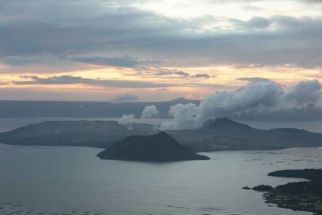A not so simple housewife
(Conclusion)
MANILA, Philippines – During the early weeks there was much talk in the press about Imelda Marcos’ “little green dress.” Every time any press appeared, any photographs were to be taken, or meetings with anyone outside those of us dealing with the Marcoses, Mrs. Marcos would put on the little green dress, which was probably the simplest dress she owned, and let it be known to the general public that this was all she came away with, with barely the clothes on her back, and that she was a poor, destitute person and she needed the sympathy of the world. This was part of an act and image they carried on for weeks…
It had been a rather tacit US assumption that they would go to some third country and not remain long in the United States… A number of alternatives emerged and were discarded. At one point there was a prospect of an offer to go to a small West African country. I recall sitting at the dining table in the Marcoses’ part of the duplex talking with the president about his options.
Mrs. Marcos was sitting perhaps 15 feet away in the sitting room area, not part of our conversation directly. Suddenly she spoke up very loudly and said, “Well, I’m not going there. If you want to go, you go ahead. I am just a simple housewife. I am going home.” She then rose and stomped out of the room. Somehow, I can never see her as the “simple housewife.”
One interlude I recall president Marcos was very interested in was an offer from the Knights of Malta, but after some investigation we were able to inform him that the Knights of Malta didn’t have a country and didn’t really have anything but a few decorations and honoraria that they could bestow upon him.
Finally, these various options centered on Panama. Negotiations proceeded with Panama with the assistance of our embassy there, and we obtained permission for… the Marcoses to rent at tremendous expense a home in the highlands in northwestern Panama…
However, Madam Aquino at the last minute called up Noriega in Panama and persuaded him that it would be a very unfriendly act to harbor the Marcoses in Panama. She very much wanted them hostage in the United States where they could be brought under pressure through our legal system. At the nth hour, with bags ready to go through Customs and the airplane fueled and ready to depart, the deal fell through. That was the last major effort to move them onward to some more permanent location.
‘I don’t understand why they are so upset about my shoes’
It became clear that we had them in the United States, whether we wanted them or not. My attention then turned primarily to trying to get them off the base into other quarters. It was six weeks before we finally succeeded.
Perhaps a few stories are interesting from that period. There was a big tree in front of this duplex, between there and the Officer’s Club that we used for the mess, and it became known by the Filipinos as the thinking tree. A few chairs were placed under the tree. I dealt with Mrs. Marcos as little as I could, since my official dealings were with the president, and she was a personality that I found very difficult and personally very repulsive. Therefore, I maintained politeness but did not try to socialize with her in any way.
However, from time to time I was caught by her. One day I was stopped by her outside under the tree. You may recall that at that time television was just full of stories about the Marcoses, and they watched them all. She came out blowing steam one day and said, “Shoes! I don’t understand why they are so upset about my shoes. We make shoes in the Philippines, it gives people work and there is nothing wrong with me buying shoes. Besides, I have a lot more shoes than that down in Tacloban.”
Well, the background of that was that her shoes were not made in the Philippines. They were all made in Italy. And when she said, “Besides, I have a lot more shoes down in Tacloban,” she was referring to the palace she had built and furnished in the central Philippines near her childhood home without her husband’s knowledge a few years previously. They went down there while I was still in the Philippines, on their annual trip to the ceremonies to reenact MacArthur’s Leyte landing.
After the ceremonies, Imelda told Ferdinand that she wanted to show him something. She took him to this palatial home and he wandered through a few rooms and turned to her and said, “Whose is this?” She said, “It is ours.” They also had such secondary palaces in quite a number of places in the Philippines. So she was saying that she had even far more shoes than the television was talking about.
I cite this only because the way she reacted was so typical: what is wrong with all this? There was a total opaqueness in her moral understanding of why anybody should get excited over such things. Why was it an issue?
Back to trying to get them off Hickam Air Base. Some of the issues that had to be resolved in the future should be thought through in advance. For example: how long would the Secret Service provide protection after they moved outside military facilities; how would the transition be conducted between the United States being responsible for security and Marcos’ own security detail? They eventually did move to a very modest home on the water, but any home on the water in Hawaii costs a lot of money. It was actually a rather small place, not easy to maintain security there because there was little distance between house or road or house and adjoining houses. It was spoken of in the press as a much more palatial place than it was.
There, too, the charade of not owning anything continued. The little green dress was trotted out upon occasion, and if Marcos was to be seen he would try to be photographed lifting weights or something showing he was fit as a fiddle and ready to go.
We did eventually work out arrangements to return a few of this entourage to the Philippines after it became clear that this was a permanent exodus by the Marcos family and clan. Some of these security people, personal servants, staff, medical personnel and others had their lives and families back home, and we returned them to the Philippines at US government expense and made arrangements to parole the immediate families of those who planned to stay in the United States under circumstances which would allow them to work and earn money.
‘I was urging the Department to disengage’
So the human thing was done properly, but it all had to be decided after the fact of the exodus, not before as would have been better. I think these issues are useful because in the future when the decisions are made there should be an awareness in advance that these are all parts of the problem. What kind of immunity is going to be granted and for what period of time? What kind of responsibilities is the US government acquiring for people who are evacuated by us? The decisions should be made ahead of time, and the party to be evacuated should be told clearly what they can bring and what they cannot bring and what the status of personal effects will be.
At the time an emergency exodus is made there is no time then to make those decisions. That is why I hope the US government will think about these things and have a plan. I actually wrote a draft plan in this regard and gave it to the Secretariat after this episode. Without that there will again be a lot of ad hoc decision making under pressure in an emotional environment. It certainly was the case in the Marcos episode, where there was a high-pressure, volatile press environment, both in our country and elsewhere. There will inevitably be cases again in the future when it is in the deep interest of the United States to avoid civil war, chaos, mayhem and death, and to help smooth a transition to a constructive future by assisting in such an enterprise…
The CINCPAC [Commander in Chief, Pacific Command] Judge Advocate worked with me full time during this period, essentially almost as my deputy, and has become a life-long friend. He later became Judge Advocate General of the Navy and retired as an admiral.
The Air Force was a little less comfortable with all of this because we were co-opting a significant part of their facilities, not only their senior officers’ quarters, but an officers’ club and a BOQ [Bachelor Officers’ Quarters], as well as Air Force personnel to establish a perimeter and checkpoints. This was fine for a few days, but it wore thin for the Air Force Base Commander very quickly.
He and I saw each other almost every day. His main interest was usually, “When are you going to get them out of here?”
They were at Hickam for six weeks, as I recall. I stayed there almost three months, because I was instructed to maintain liaison with them after they moved off base. It was a longer period than I felt advisable.
In fact, for several weeks, at least a month before it was over, I was urging the Department to disengage. I felt it was in the US interest not to appear to continue to be nurse-maiding Marcos. I felt at that point there was very little still to be accomplished. However, what was being accomplished, from Washington’s point of view, was essentially to keep Marcos off the White House’s back.
In the earlier period I was engaged in extremely intense policy issues and operational problems. In the latter part, I felt I was mostly just providing a security blanket for Washington. Admiral Poindexter (NSC) vetoed the suggestion every time the State Department supported me in suggesting we stand down.
Early on the Marcoses had picked up the phone frequently to call “Ronnie” and Mrs. Reagan, and the Reagans didn’t want that. So giving the Marcoses the sense that the US government was still concerned, paying attention to their problems and passing their messages continued to be of value to the White House beyond the point when we had accomplished most other purposes.
Chris Sibilla is the Acting President of the Association for Diplomatic Studies and Training
Part I - Imelda expected to succeed Marcos
Part II - Extracting the Marcoses
- Latest
- Trending




























